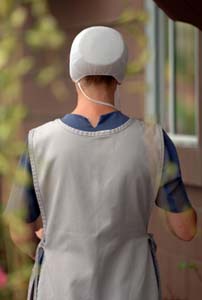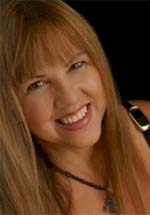
It’s been a year, and there’s now a brand-new school. The little girls are gone, buried in the rich and fertile earth of Amish cemeteries. The shooter, too, is gone, his life ended by the same gun that took the little girls. He‘s buried next to the heart-shaped stone of his infant daughter. The tiny school has been bulldozed to the ground, with nothing remaining in its place. The earth has been reseeded, though, and one day soon something beautiful might grow there.
The Amish call us the “English.” They are separate from the world; we are of it. They have no cars, no televisions, no mp3s or CDs or DVDs. They have no electricity, no computers, no violent video games to corrupt young minds. The Amish are indeed separate from the world, but a few months ago they were thrust into it with a dreadful force and horrendous heartbreak never before experienced in this community of innocence and faith.
“They were my babies,” says Rita Rhoads, a local midwife who delivered several of the victims.
We who live here in Lancaster County echo the midwife‘s sentiments: they are all of our babies, and we hold our own children tight. We hug them goodbye as they leave for school in the morning, and we hope that they come home in the afternoon. We pass the multitude of one-room schools, and we view them with new eyes. We smile at the boys hitting baseballs, and we know that they are hitting more than just the baseballs; they know that we are trying really hard to smile as if all is well with the world. We wave and go on our way. We no longer honk at the buggies moving slowly in the lane ahead; we go to great efforts to make kind eye contact with the children peering shyly from the backs of the buggies. The feeling is not unlike that after the attacks of 9-11: we’re being nicer to one another, more patient, friendlier. We’re all in this together.
There were three school shootings in America that week. It doesn’t always happen somewhere else. This time it happened here. Here. At home, in Pennsylvania Dutch Country. It can happen here. It can happen anywhere, and we have to work together to make it stop happening in this country, and everywhere.
We English rely upon our Amish neighbors for certain things. We depend upon them for fresh eggs, and sweet apple cider, and creamy pumpkin pies for our Christmas dinners. We buy their chicken pot pies and their shoofly pies and we relish their chow-chow. They churn butter and ice cream, and we enjoy the fruits of their labors. We drink the milk from their cows, and we stop frequently at their roadside stands, picking up reasonably-priced watermelons and peaches and tomatoes. We can always count on the Amish for those things. We can also count on them to hold firm to their faith, to their belief in God, to their traditions, and to the way of life that can’t be an easy road to follow.
The Amish are human, and they are still grieving. Their pain is beyond understanding. They’re weeping and they’re praying and they‘re still numb. Most striking of all: the Amish are forgiving. These humble people forgive the man who took the lives of their babies. It’s a point they make again and again. They forgive. This is God’s will. They must trust that this was meant to be; it is best. Their girls are in Heaven.
They recite Matthew 6:14, from the King James Bible: “For if ye forgive men when they sin against you, your heavenly Father will also forgive you.” The Amish live, and die, by those words. The verse sustains them, and now–at holiday time–they say that almost every conversation eventually turns to the girls.
The names read like poetry: Naomi Rose. Marian. Anna Mae. Sisters Mary Liz and Lena, who are buried together.
Never again will a school day be the same for Emma Zook, who has returned to teaching a classroom full of boys.
An Amish man embraced Charles Roberts Sr, a man who’d given his son–the shooter–the same name. The man held Mr. Roberts as he sobbed. “We forgive,” the Amish man said, again and again as the killer’s father wept. “We forgive.”
We of the world have things to learn from those not of it. We too need to forgive. We need to hope and we need to heal. We need to have faith, and we need to find a solution to the sickness that’s invaded the very soul of our nation. We need to help our children, and their children, and everybody’s children . . . before it’s too late.
On the morning of four of the funerals, I drove across the back roads of Lancaster County, heading from my home to the winding and quiet roads of Nickel Mines. Joining the media center’s throng of reporters, I stood shoulder-to-shoulder with writers from Manhattan and Philadelphia and Florida and Washington. Being a longtime journalist, I’m accustomed to the usual competitive jostling atmosphere of a media center set up to accommodate crowds of reporters all hungry for an exclusive scoop. The astounding thing this time was that the competition did not seem to exist: we were all just writers or reporters doing our jobs, trying to arrange words of the English language into sentences that would try to make sense of these horrific events. We were all just human beings with hearts that ached as we tried to find the words to describe the scene. We were mothers and fathers and grandparents, brothers and sisters and aunts and uncles and sons and daughters.
“We really appreciate how respectful you news people have been,” commented one Amish man.
“I never knew that the world cared about us,” said another. “We are so moved.”
An Amish woman teetered downhill on a rickety bicycle, snaking between the graves among which lay the infant daughter of the killer. She stopped to talk. Her name was Mary Zook, and her words will remain with me forever.
“I think those ten little girls must have been very special to have God choose them for this,” Mary said. Her gaze was steady; her eyes clear; her smile sincere. I thought it was an incredible way to look at the events that had taken two of her relatives: Mary Liz and Lina.
“I’m so touched by the way that the English people have responded to this,” Mary Zook said. “I see things differently now. I look at you in a different way.”
The night before, Mary had attended the open-casket viewing of her two young relatives. She was now on her way to the funeral, bicycling, clad head-to-toe in black.
“The girls looked so beautiful last night, dressed all in white,” she stated. “They looked sweet and innocent; just like they were sleeping. They were the sweetest girls you‘d ever want to meet: always smiling; always kind.”
Mary was calm and composed, glowing with an inner peace and assurance that all was well. I, however, was the blubbering one, as I explained to Mary Zook that my husband’s grandparents had been Amish. In fact, their names, too, were Zook. Eli Zook committed suicide back in 1962, hanging himself in his barn a month before my husband John was born. His wife Nellie accepted state assistance after Eli’s death. She was ex-communicated for that reason, but Nellie relentlessly held tight to a love and respect of her Amish background. I explained all this to Mary Zook, and noted the fact that she was probably related in some way to John’s family. Mary’s children had some of the same blood as my son; the slain sisters, too.
“Please pass our sympathies and condolences to the family,” I said to Mary. “Please tell them that we are so sorry, and that we hurt for them. Tell them that we can‘t stop thinking about them . . . And that . . . We can‘t even begin to imagine . . .” I crumbled, breaking down in a way that professional media people aren’t supposed to do.
Mary and I embraced. “I’m usually not one for hugging, but . . .” Mary said, her voice trailing off as we wrapped our arms around one another.
When I asked Mary Zook if the Amish community was aware that flags across our state were being flown at half-mast in honor of their girls, her eyes welled up for the first time.
“Thank you,” she said quietly. “Tell everyone thank you. I’ll tell the families about the flags. They’ll appreciate that.”
“The world is watching you,” I said to Mary. “The world is watching, and listening, and we are all so impressed. We’re impressed and we’re humbled and we’re in awe of your abilities to forgive. We need to be more like you.”
“And we,” said the Amish woman, “couldn’t do it without you. We are very thankful for the support. There‘s always something for which to thank God.”
As a lifelong resident of Lancaster County, I’ve never seen the Amish and English coming together in this way. There is amazing grace. My own wish is that this tragedy will build bridges of understanding and reconciliation. Respect of one another’s religions could solve a lot of problems in this scary world; I believe that it could put a stop to wars. Forgiveness can build bridges on the road to world peace.
The Amish are a people of peace. We who are of the world need to watch those who are not of it, and we need to learn. The little girls are gone, buried in the fertile earth, but we are still here, and we will go on, and we will remember. We will make things better in this world: for our children, for their children, for everybody’s children. We must.
And we’ll do it in honor of those ten little angels who were special enough to be chosen for this.
©2007, Linda Oatman High
__________________________________________
 About the Author:
About the Author:
Linda Oatman High is an author of books for children and teens, with her first book being the just-released “The Hip Grandma’s Handbook.”
Linda is available for school presentations, as well as for group speeches and workshops.
Visit her website: www.lindaoatmanhigh.com

1 comment for “Coming Together in God’s Country”